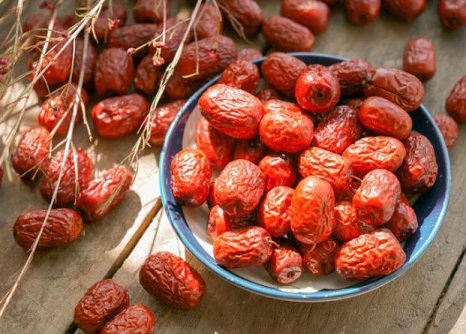Italian study finds that Jujube fruit extracts show promising potential against Herpes virus
Nikhil Prasad Fact checked by:Thailand Medical News Team Aug 28, 2024 1 year, 5 months, 2 days, 31 minutes ago
Researchers from the University of Campania "Luigi Vanvitelli" in Naples and Caserta, Italy, have made a breakthrough in the search for natural antiviral agents. This
Medical News report delves into their study, which explores the antiherpetic potential of extracts from jujube drupes (Ziziphus jujuba Mill.), a fruit with a rich history in traditional medicine. The study is particularly timely, given the increasing global incidence of viral infections and the growing resistance of herpes simplex viruses (HSVs) to standard antiviral drugs. This article will explore the key findings and implications of this exciting research.
 Italian study finds that Jujube fruit extracts show promising potential against Herpes virus
The Problem with Current Antiviral Treatments
Italian study finds that Jujube fruit extracts show promising potential against Herpes virus
The Problem with Current Antiviral Treatments
Herpes simplex viruses (HSV-1 and HSV-2) are notorious for causing infections primarily in the orofacial and genital areas, though they can also lead to severe conditions like herpes simplex encephalitis (HSE) and neonatal herpes. These infections are becoming increasingly challenging to treat due to the limited range of effective antiviral drugs. The most common treatments involve nucleoside analogs like acyclovir, which interfere with viral DNA replication. However, these treatments are often insufficient, especially in severe cases, making the search for new antiviral compounds a high priority.
Jujube: A Fruit with Hidden Powers
Jujube, also known as Chinese date, is one of the oldest cultivated fruit plants in the world. This "super-fruit" is not only valued for its nutritional content but also for its bioactive compounds, including triterpenic acids, alkaloids, polyphenols, and other pigments. These compounds have been studied for various health benefits, including anti-inflammatory, antioxidant, and antiviral properties. However, the researchers in this study focused on the antiviral capabilities of different parts of the jujube fruit - specifically the peel, pulp, and seed.
The Study's Methodology
The researchers collected mature jujube fruits from Naples in October 2022. These fruits were then dissected into peel, pulp, and seed, each of which was subjected to a meticulous extraction process using ultrasound-assisted maceration in pure ethanol. The extracts were further fractionated to isolate specific components, such as polyphenols and lipids. The chemical profiles of these fractions were analyzed using high-resolution mass spectrometry (HRMS), and their antiviral activity against HSV-1 was tested in various experimental setups.
Key Findings: Polyphenols and Lipids as Antiviral Agents
The study's findings were striking. The researchers discovered that the polyphenolic fractions, particularly those from the peel and pulp, and the lipophilic fraction from the peel, exhibited strong inhibitory activity against HSV-1. These fractions were most effective in the early stages of viral infection, preventing the virus from attaching to host cells. The lipid fractions, especially those enriched in ursane-type triterpenes like ursolic acid and ursonic acid, showed the highest antiviral acti
vity.
In addition to their antiviral potential, the extracts were found to be non-toxic to the host cells at the concentrations tested, making them promising candidates for further development as antiviral agents.
How Jujube Extracts Inhibit HSV-1
To better understand how these extracts inhibit HSV-1, the researchers conducted a series of experiments. They found that the extracts were most effective when the virus was directly exposed to them, suggesting that the compounds in the extracts interact with the viral particles, preventing them from infecting the host cells. Real-time PCR and Western blot analyses confirmed that the extracts significantly reduced the expression of a critical viral gene, UL27, which encodes a protein essential for viral entry into host cells. This finding supports the idea that the jujube extracts act during the initial stages of viral infection, blocking the virus's ability to attach and penetrate host cells.
The Broader Implications of the Study
The implications of this study are far-reaching. The discovery that jujube extracts can inhibit HSV-1 opens up new avenues for the development of natural antiviral treatments. Given the increasing resistance of herpesviruses to existing drugs, these findings could lead to the creation of more effective and safer antiviral therapies. Furthermore, the use of natural products like jujube could reduce the reliance on synthetic drugs, which often come with significant side effects.
The study also highlights the importance of exploring the chemical diversity of plants and their potential as sources of new medicinal compounds. The unique composition of the jujube fruit, with its rich polyphenolic and triterpenic content, demonstrates how nature's pharmacy still holds many untapped resources for combating human diseases.
Conclusion
In conclusion, the study findings has provided valuable insights into the antiviral potential of jujube fruit extracts. The findings suggest that these extracts, particularly the polyphenolic and lipophilic fractions, could be developed into effective antiviral agents against HSV-1. This research represents a significant step forward in the search for new, natural treatments for viral infections, and it underscores the importance of continued exploration of plant-based compounds in medical research.
The study findings were published in the peer-reviewed journal: Heliyon.
https://www.sciencedirect.com/science/article/pii/S240584402413068X
For the latest on herpes viruses, keep on logging to Thailand
Medical News.
Read Also:
https://www.thailandmedical.news/news/new-study-highlights-the-role-of-autoimmunity-human-herpes-virus-6-reactivation-and-inflammation-in-long-covid
https://www.thailandmedical.news/news/cftr-inhibitors-show-promise-against-herpes-hsv-1-and-hsv-2-infections
https://www.thailandmedical.news/news/new-treatment-strategy-shows-promise-in-combatting-herpes-simplex-virus-type-2
https://www.thailandmedical.news/news/herpes-virus-manipulates-autophagy-in-brain-cells-for-survival 